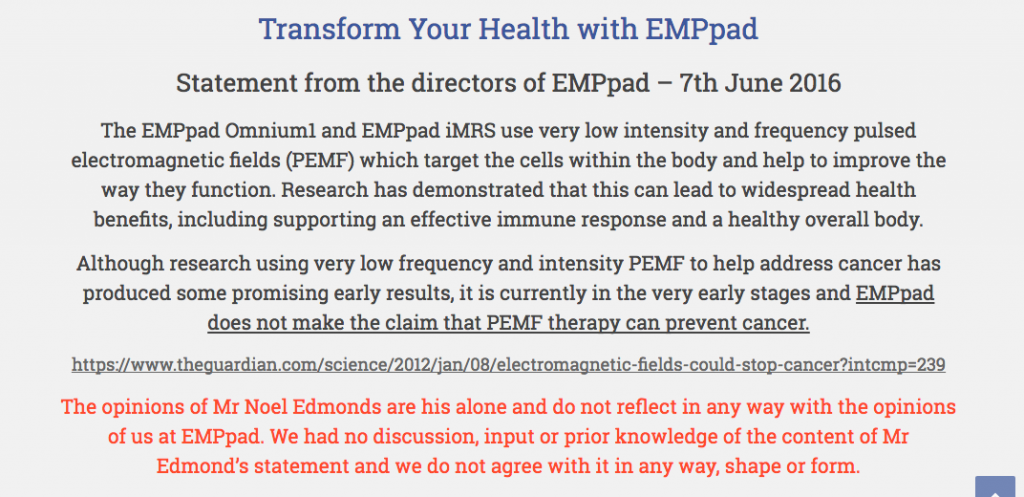Some crises emerge from issues which bubble up over time: think, labour disputes, QA issues, executive pay. Others strike suddenly from known risks: extreme weather, terrorism or industrial accidents.
Some though, come of out of a clear blue sky. Pity the team at EMP Pad Ltd when this landed in their Twitter mentions yesterday, from 1980s evergreen British TV personality Noel Edmonds:

Twitter did its thing.
Is Charlotte Edmonds, Director of Bucket Management Ltd, 50% owner of the product's distributor, your daughter, by any chance?
— Tony Eagleton (@tonyeagleton) June 7, 2016
I suspect @NoelEdmonds owns the company, or at least shares in it. ASA should be investigating this campaign of his.
— Russel Winder (@russel_winder) June 7, 2016
@NoelEdmonds pic.twitter.com/2v3C5W27PM
— jojubs (@jojubs) June 7, 2016
How does @NoelEdmonds expect us to believe his magic box can tackle cancer when he let Mr Blobby suffer the pox for all those years.
— Richard Chambers (@newschambers) June 7, 2016
And the regulators, to their credit, were straight onto it:
Hi Paul, we're currently investigating EMPpad products to see if there are any breaches of Medical Device Regulations 2002
— MHRA News Centre (@MHRApress) June 7, 2016
The social media response – as it so often does – mixed humour with serious investigation, cynicism with knee-jerk hostility and gave journalists an easy story to write.
Curiously, there was nothing from EMP Pad themselves on their Twitter account, but the firm did take over its homepage with a large statement distancing itself from Mr Edmonds’ claim in pretty strong terms:

The wider point is an interesting one, and an angle that we throw into our crisis scenarios and simulation exercises from time to time: what happens when polarising public figures pick sides and choose you?
Brands devote time and effort to vetting and managing their chosen celebrity ambassadors, but the added publicity and instant backlash from a prominent columnist or presidential candidate deciding you’re in the right (while insulting your antagonists) is something that few are prepared for, particularly under pressure of the crisis spotlight.
Ignore them, and it looks like you’ve recruited some tricky publicists; attempt to distance yourself and you risk a further bout of publicity as your new-found friends take offense. Either way, it’s a distraction from managing the incident at hand and getting your reputation back on track, as well as great material for social media commentators and lazy journalists looking for something quotable (Noel Edmonds is due to hit the breakfast TV sofas this morning, he says).
As with all crisis decision-making, there are few definitively right answers. Maintaining a steady rhythm of communication, across the channels where the discussion is happening, comprising a clear statement of what you’re doing and why, is a good rule to live by. Where your self-appointed ambassadors risk spreading misinformation or causing you (as in the EMP Pad case) trouble with regulators, then it’s worth making clear the relationship between you. But don’t grapple too much in social media with the characters themselves and don’t confuse usually short-lived Twitter comedians’ memes with a long-lasting reputational damage. On that score, it looks like EMP’s approach yesterday was a smart one.
